by Shadab Zeest Hashmi
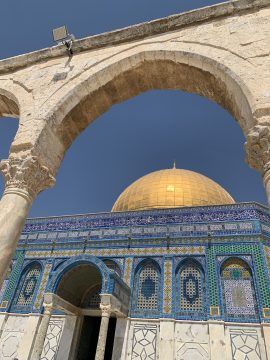 “Taxi to Bethlehem, taxi to Jericho!” the man at a tourism kiosk is shouting, as I make my way from the tram to Jaffa Gate, known also as Hebron Gate, to Muslims as “Bab al Khalil,” or “door of the friend,” named after Hebron where the prophet Ibrahim/Abraham (Khalil al Allah “God’s Friend”) is laid to rest. Of significance too, is the association of this gate with King David’s (prophet Dawud’s) chamber, for followers of the three Abrahamic faiths: the crusaders named it “King David’s Gate.” It is one of the seven main stone portals of the walled city of Jerusalem.
“Taxi to Bethlehem, taxi to Jericho!” the man at a tourism kiosk is shouting, as I make my way from the tram to Jaffa Gate, known also as Hebron Gate, to Muslims as “Bab al Khalil,” or “door of the friend,” named after Hebron where the prophet Ibrahim/Abraham (Khalil al Allah “God’s Friend”) is laid to rest. Of significance too, is the association of this gate with King David’s (prophet Dawud’s) chamber, for followers of the three Abrahamic faiths: the crusaders named it “King David’s Gate.” It is one of the seven main stone portals of the walled city of Jerusalem.
To reach the street level at the train station in Jerusalem, one must take four escalators up, three of them vertiginously long. I’m reminded that this is the city of ascensions: miracles associated with Abraham, Jesus and Muhammad. The ancient, sacred expanse, rises up as an invisible, vertical cityscape. Jerusalem’s silhouette is cast in the worshippers’ perception of the heavens— avenues in the air— leading to a divine promise. The tragedy of the spirit agonizing to make peace with God as it barters peace with fellow-humans, is more raw here than anywhere else.
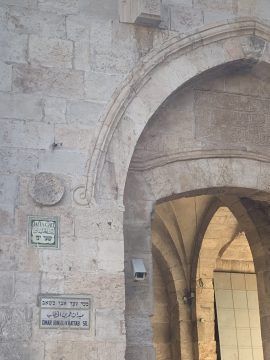 Jerusalem— named for peace.
Jerusalem— named for peace.
As I walk through the streets with my Israeli-American friend Esti, my attention is taken up by other women around us: a nun’s habit bellowing in the breeze, Jewish women walking in groups, wearing long skirts and headscarves, Muslim women in hijabs, many women in the nondescript summer tourist attire.
Beautiful as it is, Jerusalem of the heart appears and melts away every few steps— the beloved comes within reach, retreats just as quickly: in these streets, the sacred asks to be retrieved from the feeling of mistrust; armed soldiers never leave the peripheral vision.
For every square-foot of the old city, there is lore passed down as ultimately a remembrance, a feeling, but also written down in volumes of spirituality, theology, history, myth-making, poetry, politics by people of the Abrahamic faiths around the world and through the millennia. The location on google maps is tiny, the names recall events of astounding sweep.
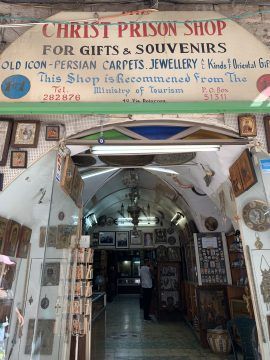 This is a place of pilgrimage and tourism, a great market for charms. Throughout the streets and bazars, people sell Abrahamic charms: menorahs, crosses, stars of David, prayer beads with the 99 names of God. I buy souvenir ceramic tiles with tulips, an Islamic pattern, one that says “Shalom/Salam” in Arabic and Hebrew, and an over-shirt with Palestinian embroidery.
This is a place of pilgrimage and tourism, a great market for charms. Throughout the streets and bazars, people sell Abrahamic charms: menorahs, crosses, stars of David, prayer beads with the 99 names of God. I buy souvenir ceramic tiles with tulips, an Islamic pattern, one that says “Shalom/Salam” in Arabic and Hebrew, and an over-shirt with Palestinian embroidery.
On our way to Al Aqsa and the Western Wall, we walk through the holy stations of the cross, small museums, shops and restaurants. From the gate of the market of the cotton-traders, I see the first glimpse of the dome of the rock. As with most Islamic buildings, the architectural motifs here convey the sensation of a garden, softening the stone in the harsh summer light with the fluid hues of blue and green, colors of streams and foliage in conversation with the heavens.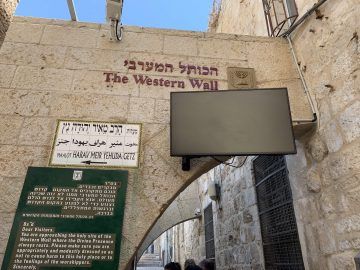
The Al Aqsa, established in the seventh century by caliph Umar bin Khattab, is open only to Muslims at prayer times; besides the main congregational area, there are many small mosques— one of them honors Mary (Maryam) and is built adjacent to her chambers.
Muslims offer prayers in the mosques signifying the sacred areas where the prophet Muhammad (sallalahu alaihay wassalm) departed for Isra and Miraj, the miraculous night journey and the ascension. Some of these nooks are accessed by staircases underground, where it is much cooler than ground level and the floor is covered with a lovely prayer carpet.
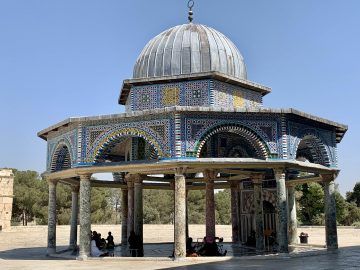 As I offer the short two-rakat prayer in each of the mosques, I’m struck by the number of times the blessing for the Abrahamic people appears in the Muslim prayer: “O Allah, send prayers upon Muhammad and upon the family of Muhammad, as You sent prayers upon Abraham and upon the family of Abraham; You are indeed Worthy of Praise, Full of Glory. O Allah, send blessings upon Muhammad and upon the family of Muhammad as You sent blessings upon Abraham and upon the family of Abraham; You are indeed Worthy of Praise, Full of Glory.”
As I offer the short two-rakat prayer in each of the mosques, I’m struck by the number of times the blessing for the Abrahamic people appears in the Muslim prayer: “O Allah, send prayers upon Muhammad and upon the family of Muhammad, as You sent prayers upon Abraham and upon the family of Abraham; You are indeed Worthy of Praise, Full of Glory. O Allah, send blessings upon Muhammad and upon the family of Muhammad as You sent blessings upon Abraham and upon the family of Abraham; You are indeed Worthy of Praise, Full of Glory.”
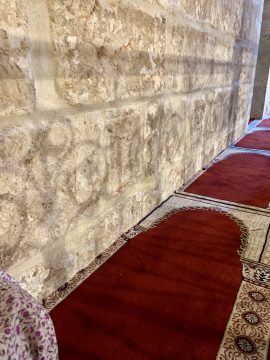 Jerusalem – city of peace.
Jerusalem – city of peace.
